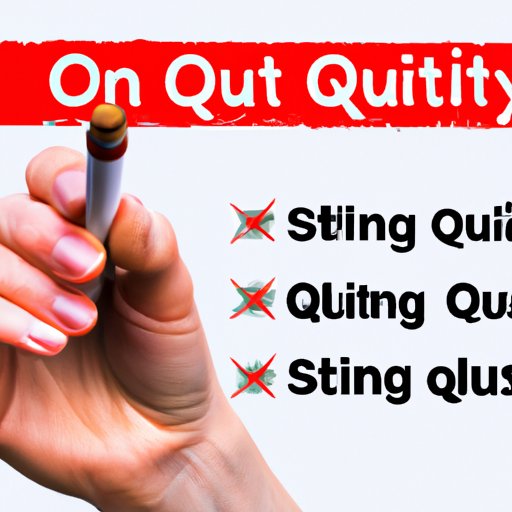Introduction
According to the Center for Disease Control and Prevention, smoking is the leading cause of preventable death worldwide. Quitting smoking can greatly improve overall health and wellbeing, and benefit not just the individual but also society as a whole. This article aims to provide tips and advice on quitting smoking, exploring different methods and personalized plans, outlining the benefits of quitting smoking, the challenges one may face, and the impact of smoking on environment and society.
Different Methods for Quitting Smoking
There are various methods one can choose from when it comes to quitting smoking. These include nicotine replacement therapies, support groups, natural remedies, and lifestyle changes.
Nicotine Replacement Therapies
Nicotine replacement therapies, such as patches, gum, lozenges, and inhalers, can help ease withdrawal symptoms by providing a nicotine substitute without the harmful chemicals found in cigarettes.
Support Groups
Joining support groups or seeking professional counseling can provide emotional support and motivation during the quitting process. These groups offer a safe and non-judgmental environment for individuals to share their struggles and success.
Natural Remedies and Lifestyle Changes
Practicing mindfulness meditation, deep breathing exercises, and engaging in physical activities such as running and yoga can help individuals manage stress and anxiety. Eating a balanced diet, staying hydrated, and avoiding alcohol can also improve overall health and reduce cravings.
Personalized Quitting Smoking Plans
There is no one-size-fits-all approach when it comes to quitting smoking. Individuals can choose from different personalized plans to suit their needs and lifestyle.
Cold Turkey Plan
Cold turkey plan involves stopping smoking abruptly without any nicotine substitutes or support groups. This plan may work well for individuals who have high motivation and determination, but it may not be suitable for everyone.
Gradual Phasing Out Plan
Gradual phasing out plan involves cutting down the number of cigarettes smoked every day until quitting completely. This plan may work well for individuals who want to take a slower approach and gradually adjust their habits.
Need for Extra Support Plan
For individuals who struggle with addiction or have other health conditions, seeking professional help and additional support may be necessary. This plan involves developing personalized treatment plans and working closely with medical professionals and counselors.
Benefits of Quitting Smoking
The benefits of quitting smoking are vast and immediate. The human body begins to repair itself within minutes of smoking the last cigarette.
Immediate Health Benefits
Within 20 minutes of quitting smoking, blood pressure and pulse rate decrease. Within 12 hours, carbon monoxide levels in the blood decrease, and oxygen levels return to normal. Within 48 hours, smell and taste improve, and nerve endings begin to regrow.
Long-Term Health Benefits
The long-term health benefits of quitting smoking include reducing the risk of heart disease, stroke, lung cancer, and throat cancer. It also reduces the risk of gum disease, ulcers, and vision problems.
Challenges of Quitting Smoking
Quitting smoking is not easy, and there are various challenges one may face during the process.
Cravings
Cravings for nicotine can be intense during the quitting process, leading to irritability, mood swings, and difficulty concentrating.
Motivation
Staying motivated throughout the quitting process can be challenging. It may help to set goals, remind oneself of the reasons for quitting and engaging in positive self-talk, and finding a support system.
Withdrawal Symptoms
Withdrawal symptoms can include headaches, nausea, coughing, and sore throat. These symptoms usually peak within the first few days and gradually improve over time.
Impact of Smoking on Environment and Society
Smoking not only affects individual health, but it also has an impact on the environment and society at large.
Environmental Impact
Cigarette manufacturing, distribution, and disposal have a significant impact on the environment. Cigarette litter is a widespread problem, leading to pollution in oceans and waterways. Cigarette smoke also contributes to air pollution and climate change.
Social Consequences
Smoking imposes a significant economic burden on society. It costs billions of dollars each year in healthcare costs and lost productivity. Secondhand smoke also poses health risks to non-smokers, and smoking-related illnesses can strain family relationships and social connections.
Role of Technology in Quitting Smoking
Technology can play a significant role in quitting smoking, providing support and motivation through various tools and platforms.
Smoking Cessation Apps
Smoking cessation apps offer tools and resources to help individuals quit smoking, such as tracking progress, setting goals, and providing reminders and motivation.
Wearable Devices
Wearable devices such as smartwatches can track physical activity and heart rate and provide a visual representation of progress over time.
Online Support Communities
Online support communities offer a safe and non-judgmental environment for individuals to connect with others who are going through the same challenges.
Conclusion
Quitting smoking is not easy, but it is a vital step towards improving health and wellbeing. Understanding the different methods and personalized plans, knowing the benefits, preparing for the challenges, and being aware of the impact of smoking on environment and society can help ease the quitting process. With determination, motivation, and support, quitting smoking is possible.
If you’re struggling to quit smoking, don’t give up. Seek help and support from friends, family, and medical professionals to help you quit smoking for good.
